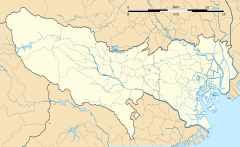Kyōbashi Station (Tokyo)
Appearance
This article needs additional citations for verification. (May 2022) |
G10 Kyobashi Station 京橋駅 | |||||||||||
|---|---|---|---|---|---|---|---|---|---|---|---|
 The Meidi-ya (No. 7) entrance in August 2017 | |||||||||||
| General information | |||||||||||
| Location | 2-2-10 Kyōbashi, Chūō-ku, Tokyo Japan | ||||||||||
| Coordinates | 35°40′36″N 139°46′12″E / 35.676725°N 139.770083°E | ||||||||||
| Operated by | |||||||||||
| Line(s) | G Ginza Line | ||||||||||
| Distance | 6.4 km (4.0 mi) from Asakusa | ||||||||||
| Platforms | 1 island platform | ||||||||||
| Tracks | 2 | ||||||||||
| Construction | |||||||||||
| Structure type | Underground | ||||||||||
| Other information | |||||||||||
| Station code | G-10 | ||||||||||
| Website | Official website | ||||||||||
| History | |||||||||||
| Opened | 24 December 1932 | ||||||||||
| Passengers | |||||||||||
| FY2012 | 43,576 daily | ||||||||||
| Services | |||||||||||
| |||||||||||
| |||||||||||
Kyobashi Station (京橋駅, Kyōbashi-eki) is a subway station on the Tokyo Metro Ginza Line in Chūō, Tokyo, Japan, operated by the Tokyo subway operator Tokyo Metro. It is numbered "G-10".
Lines
[edit]Kyobashi Station is served by the 14.3 km (8.9 mi) Tokyo Metro Ginza Line from Shibuya to Asakusa, and lies 6.4 km (4.0 mi) from the starting point of the line at Asakusa.[1]
Station layout
[edit]The station has one underground island platform, located on the 2nd basement (B2F) level, serving by two tracks.
Platforms
[edit]| 1 | G Ginza Line | for Akasaka-mitsuke and Shibuya |
| 2 | G Ginza Line | for Ueno and Asakusa |
-
Entrances No. 1 and 2 in August 2017
-
Entrance No. 5 in August 2017
-
Entrance No. 5 in August 2017
-
Platforms in 2018
History
[edit]Kyobashi Station opened on 24 December 1932.[1]
The station facilities were inherited by Tokyo Metro after the privatization of the Teito Rapid Transit Authority (TRTA) in 2004.[2]
Passenger statistics
[edit]In fiscal 2012, the station was used by an average of 43,576 passengers daily.[3]
Surrounding area
[edit]- Meidi-Ya main store
- The Police Museum
Stations
[edit]Hotels
[edit]Corporate headquarters
[edit]- Meiji Holdings head office
- Sumitomo Dainippon Pharma Tokyo head office
See also
[edit]References
[edit]- ^ a b Terada, Hirokazu (19 January 2013). データブック日本の私鉄 [Databook: Japan's Private Railways]. Japan: Neko Publishing. p. 214. ISBN 978-4-7770-1336-4.
- ^ "「営団地下鉄」から「東京メトロ」へ" [From "Teito Rapid Transit Authority" to "Tokyo Metro"]. Tokyo Metro Online. 8 July 2006. Archived from the original on 16 May 2012. Retrieved 29 May 2022.
- ^ 首都圏鉄道完全ガイド 地下鉄・その他私鉄編 [Tokyo Area Complete Railway Guide - Subway and Other Private Lines] (in Japanese). Japan: Futabasha. 23 July 2014. p. 10. ISBN 978-4-575-45450-5.
External links
[edit]Wikimedia Commons has media related to Kyōbashi Station (Tokyo).








